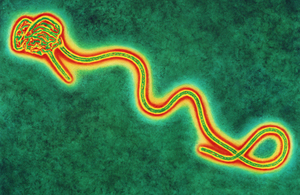Enhanced Ebola screening process begins
Public Health England begins enhanced screening for Ebola at Heathrow airport.

Public Health England (PHE) is helping to roll out enhanced screening for Ebola starting at Heathrow, then Gatwick and St Pancras (Eurostar), in passengers that Border Force officers identify as having travelled from Sierra Leone, Guinea and Liberia.
Passengers will have their temperature taken and complete a questionnaire asking about their current health, recent travel history and whether they might be at potential risk through contact with Ebola patients. Based on the information provided and their temperature, passengers will either be given advice and allowed to continue their journey, or undergo a clinical assessment by PHE staff and if necessary be transferred to hospital for further tests.
Dr Paul Cosford, director for health protection and medical director at PHE, said:
Anyone who is well but may have been at increased risk of contact with the Ebola virus will be given printed information and a PHE contact number to call in case they develop symptoms. People infected with Ebola can only spread the virus to other people once they have developed symptoms, such as a fever. Even if someone has symptoms, the virus is only transmitted by direct contact with the blood or body fluids of an infected person.
It’s important to remember this is just 1 part of the screening process. PHE is also working with the international community and local health authorities to ensure robust exit screening remains in place at airports in Sierra Leone, Guinea and Liberia, which will pick up anyone who is symptomatic before they leave these countries.
Although no system can completely prevent a case of Ebola coming into the UK, enhanced screening in high volume ports of entry will ensure that individuals at risk know exactly what to do if they start feeling ill, and can receive the expert advice they need immediately.
Overall the risk of Ebola in the UK remains low, and we have a world-class domestic health system that is ready to respond if we do see a case in the UK.
Ends
Notes to editors
- A range of the Ebola guidance issued by PHE can be accessed from the Ebola virus disease: clinical management and guidance page.
- Public Health England exists to protect and improve the nation’s health and wellbeing, and reduce health inequalities. It does this through advocacy, partnerships, world-class science, knowledge and intelligence, and the delivery of specialist public health services. PHE is an operationally autonomous executive agency of the Department of Health. Website: www.gov.uk/phe. Twitter: @PHE_uk, Facebook: www.facebook.com/PublicHealthEngland.
UKHSA press office: National Infection Service
UKHSA press office, infectious diseases
61 Colindale Avenue
London
NW9 5EQ